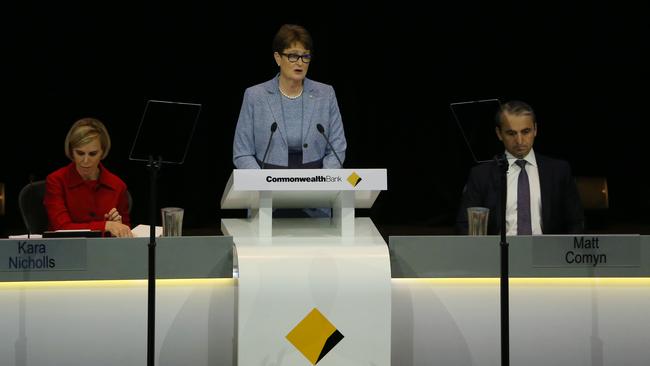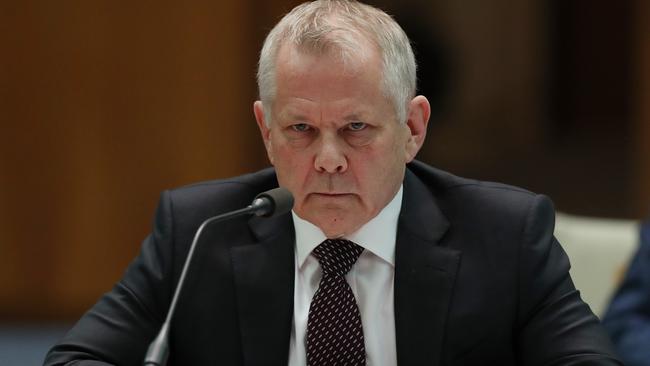Policy consistency, skills growth will boost business post-Covid
Business needs to know the rules as economy emerges from pandemic so it can adjust accordingly.

CBA chair Catherine Livingstone has called for policy consistency to ensure Australia emerges from the coronavirus pandemic in better shape, saying business needed to know what the rules were so it could adjust accordingly.
Speaking at The Australian’s Strategic Forum alongside NAB chair Phil Chronican, Ms Livingstone said alongside policy consistency, other levers that needed to be pulled as the nation steps out from the crisis included a focus on skills and good execution of the government’s recovery plan.
“The number one lever is policy consistency over time. From a business perspective you just need to know what the rules are and then you can adjust accordingly,” she said.
“I think too, focusing on the vital few, and I would say the levers that need to be pulled and are being pulled are a focus on skills, which came through very strongly in the budget, and a focus on digital capability.”
The program laid out in the federal budget was very ambitious, Ms Livingstone said.
“I’m not sure we’ve fully grasped how ambitious and potentially long term it is. I absolutely endorse the thrust of it but the key will be execution. Good execution is another lever.”
Australia could enjoy a productivity surge post-Covid, but only by leveraging digital skills, she warned.
“We could get a productivity surge through real deployment of a truly digital economy. That’s more than having a nice website and a nice app, it’s leveraging the digital skills and the uplift we’ve seen as a result of Covid. The irony in the digital space is the jobs are there but the skills aren’t.”
On the rising tensions with China, Ms Livingstone said there was a broader question on the diversification of the Australian economy.
“It’s a longer-term issue but it does have to be an imperative regardless of the current issues with China. and we have demonstrated in the past that we can diversify our markets. Australia has demonstrated flexibility and the ability to respond to changes in access to market but underneath all of that we must focus on diversifying our economy,” she said.
China would be Australia’s largest trading partner irrespective of the day-to-day issues, Mr Chronican said.

It’s an extraordinarily significant trade relationship. It’s not a relationship that’s suddenly going to disappear just because there are some geostrategic issues. We’re not going to solve those (issues) by taking more entrenched positions on each side.
“Even with some of our closest allies we have disputes from time to time. What’s unusual is the number we’ve got at the moment.”
On the implications of Australia’s closed borders and long-term immigration policy Mr Chronican said Australia had benefited from being an open economy and needed some level of migration to grow.
“That doesn’t mean we have to get back to the levels of migration we had previously. A measured return to migration will be an important factor in our recovery,” he said.
“It’s clear that up until relatively recently our migration program was getting ahead of our infrastructure capability. We’ve seen some real pressures come on in infrastructure. There’s a couple of things changing now: more infrastructure is being built but also less emphasis on getting people to CBDs.”
Immigration considerations
Ms Livingstone said it was important to not be simplistic when considering immigration and that it didn’t deliver “free growth”.
“When you look at Australia’s rate of immigration, we have the highest in the OECD other than Luxembourg,” she said.
“So we do have to recognise the impact on a very high rate of immigration on an existing base and what that means for managing that and the investments you have to make and also the skills you’re bringing in.”
“Immigration delivers growth if you have the skills and the people coming who are keen to build a life or a business in the country.”
Ms Livingstone said over 400,000 expats had returned to Australia during the pandemic.
“That‘s a massive injection of people and skills so I don’t think we should underestimate the impact of that.”
Strong housing market
Those expats were part of the reason the housing market was so strong of late, she said.
“The housing market, anecdotally, is extremely strong. One of the factors will be all of the returning expats, they’ve made up for the lack of immigration.
“I think we have to be quite watchful. We’ve just seen the impact of the most recent moves by the RBA so perhaps over the next few months we’ll get a better feel if that strength is going to be maintained or if it was just a spike. But it is very strong at the moment,” she said.
On loan deferrals, Mr Chronican said 70 per cent of the banking customers industrywide who had taken repayment holidays had started to pay back their loans. He predicted 90 per cent of those customers would ultimately get back to repayments but that there were difficult conversations ahead for a small number of borrowers.
“There’s still going to be a significant issue as we go forward. There’ll be companies whose business models don’t work in a Covid-normal environment and some households that will be under financial stress.
“When you manage through a cycle like this you’ve got to behave with sensitivity to customers and you’ve got to behave responsibly. And that will mean some customers will have to face the fact that we can’t support them any further.”
True meaning of ‘responsible lending’
Next year would not be an easy year for the bank, he said.
“The true meaning of responsible lending is you can’t extend credit to people who can’t afford to pay it back, he said. It is important for us as a bank and for all the banks that we manage carefully through that situation because we’ll be remembered for how we treat people through hard times.”
Turning to the US election and the incoming Biden administration, Ms Livingstone said it would offer Australia more predictability and structure.
“Biden has said in the past he’s someone who looks for common ground and a middle ground, which will be useful when we’re looking at trade,” she said.
“There have been some very positive signals in terms of initial moves to reset the way the US works with the rest of the world.”
Mr Chronican said it was important to temper expectations for a Biden administration in terms of trade negotiations.
“If we go back to 2017, both sides were against the trans-Pacific Partnership. But there are some signs with Paris and the WHO where we will see the Biden administration take a different approach.”
“I think what we should expect is a more communicative approach so the allies will be more involved.”




To join the conversation, please log in. Don't have an account? Register
Join the conversation, you are commenting as Logout